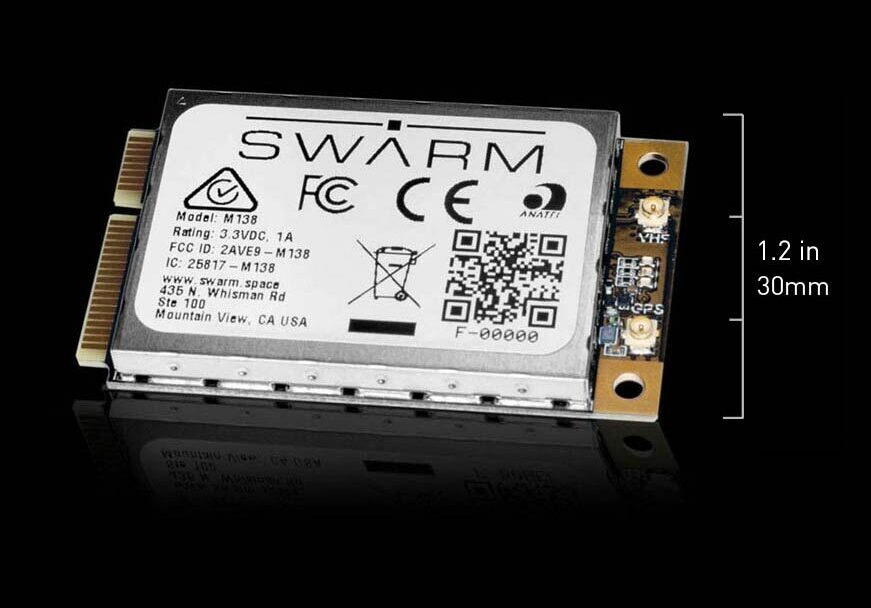
Swarm Chats: Emily Calandrelli, Engineer, Author, and Emmy-Nominated TV Host
April 28, 2021
As an MIT-trained engineer, author, tech journalist, and Emmy-nominated TV host, Emily Calandrelli, known to her many fans as The Space Gal, has no trouble staying busy! Emily’s passion for space and encouraging girls to explore STEM fields led her to write a successful children’s book series, develop and host a hit Netflix show, Emily’s Wonder Lab, and travel the world to speak about these topics.

For our latest Swarm Chats, Emily sat down with Swarm CEO Sara Spangelo to discuss the democratization of the space industry, getting girls interested in STEM, and how companies’ use of social media can help (or hurt) their ability to hire diverse talent.
Sara Spangelo: You’ve spent most of your career either directly in the space industry or encouraging others to explore it. What made you decide to pursue that career path in the first place?
Emily Calandrelli: I knew I wanted to do engineering when I was in high school, but I didn’t know what type. In college at West Virginia University, I saw a poster of a student floating and it said “do your homework weightless”. It turned out to be an aerospace engineering class where you got to fly on the “Vomit Comet”. That sounded like the coolest thing I’d ever heard of. I decided to go into aerospace engineering so I could fly on the Vomit Comet, and that was my initial “in” to the space industry.

SS: I had a similar experience going to space camp as a kid! What trend or innovation are you most excited about right now in terms of its potential to impact the space industry?
EC: I think the obvious answer is lower cost launches because it’s lowering the barrier of access to space, and when more people can do the same thing you’re going to see innovation. I’m also really excited about things that make space as an economy and an idea feel more accessible. I recently saw a telescope where you could program a place in the sky and it would show you the view on your iPad. It felt like a revolutionary idea to make the night sky more accessible. Even social media has brought space news and launches to more people. When you have public support of the space industry, that often translates into congressional support, which often translates into funding… so any way we can democratize the concept of space is really useful to the industry as a whole.
I’m really excited about things that make space as an economy and an idea feel more accessible. When you have public support of the space industry, that often translates into congressional support, which often translates into funding. Any way we can democratize the concept of space is really useful to the industry as a whole.
SS: Yes! I think GPS is similar – everyone uses it without realizing it’s satellite-based. And when you start to use a technology all the time you want to fund it and support it.
On the flip side, is there anything that you’re seeing in the space industry right now that has you frustrated?
EC: There are certain company leaders that say things online that make their company feel less welcoming to certain people, and that starts to homogenize the type of people who work in the space industry. When technology starts getting made by a homogeneous group of people, suddenly that technology is only made for that group of people. When you don’t include diversity in design, it leads to problems down the line. More companies could be more thoughtful around that.
When technology starts getting made by a homogeneous group of people, suddenly that technology is only made for that group of people. When you don’t include diversity in design, it leads to problems down the line.
SS: That’s definitely something I think about as a woman aerospace leader. Swarm is 25% women which I’m very proud of, but still not 50/50 and we still lack female senior engineering leadership. How do you think companies can improve this?
EC: Social media is a great place to start. Find ways to reach out to the people you’re hoping to recruit. And be thoughtful about who is crafting your social media messaging. If you’re trying to reach a certain demographic, make sure that demographic is helping to craft the message and strategy. And if there are members of the company who are part of the demographic you’re looking to attract, make sure they have decision-making power in terms of those strategies.

SS: I love that focus on being welcoming. We’ve had female software engineering candidates, for example, that have been fast-tracked to talk to me versus other members of the team because I can talk about our company from my perspective early on and make that connection with them.
EC: I think one clear way you can make a company feel more welcoming is making sure the leadership positions are more diverse. What better way to make traditionally marginalized people feel more welcome than to have members of that community in leadership roles?
One clear way you can make a company feel more welcoming is making sure the leadership positions are more diverse. What better way to make traditionally marginalized people feel more welcome than to have members of that community in leadership roles?
SS: You’ve also leveraged social media as a platform to get more kids and girls interested in science and space. How do you think startups should be leveraging this platform?
EC: Social media is so powerful for the space industry. Share why you make certain decisions and educate people. Satellites and connectivity can be very complex, so educating people on broader industry context is really helpful even when it doesn’t have to do with your specific company. In terms of platforms, I would say reach people where they’re at. If you’re trying to reach young people, that might mean Tik Tok. If your products are visually appealing, Instagram can be a great tool for telling stories.
SS: What do you think the impact of low-cost, satellite connectivity for connecting devices will be on the world over the next few years?
EC: Huge! I can’t quite comprehend how much it will change the world. People don’t realize that almost half the global population is still not connected to the Internet. The World Wide Web is not actually “worldwide”. This is a tool that helps build businesses and economies and bring healthcare information and education to people. It’s an infrastructure tool that changes the world. When that can be made more accessible, it will be a game-changer.
The World Wide Web is not actually “worldwide”. This is a tool that helps build businesses and economies and bring healthcare information and education to people. When that can be made more accessible, it will be a game-changer.
SS: Looking back over your career so far, what is one thing you’re most proud of having accomplished?
EC: Right now, Emily’s Wonder Lab. I’d been pitching science shows to large networks for years and I kept getting the feedback that the majority of the audience was male, so they didn’t want a solo female host. At one point I was asked if I had a male friend that could co-host the show with me. That’s very frustrating feedback to hear. They seem to forget that half the population is women! Now that I have my show on Netflix, there is a show out there with a 9-month pregnant woman talking about science on the largest streaming platform in the world. I’m very proud of that, and very grateful to Netflix for making that decision.

SS: It’s a fantastic show! I think young girls are really curious about science in general, and this could have a tremendous impact on them.
EC: I was blown away by the number of girls who dressed up as me on the show for Halloween, saying they wanted to be a scientist! We are changing the image kids have in their brain when they think “scientist”, and that’s so groundbreaking.
SS: What is one habit or way of doing things that has made you successful throughout your career?
EC: I’ve always had my day job but also a fun side project going on. Sometimes the projects work and sometimes not. I tried to be a tech journalist, which I didn’t particularly enjoy. And then I tried to write a children’s book, which I loved. As you start to try things outside of your comfort zone, you become less afraid of failing. That’s really helped me.
SS: If you could moonlight for a week in a totally different career, what would you do?
EC: I would love to act in a Broadway show! I have many different jobs but I do almost all of them by myself at home, so I’d love to work with a big team on something that’s really intense where you feel that camaraderie. I also like the concept of performing. So I would love to do that… if I could sing!
___________
This interview has been lightly edited for clarity and length.
Want more? Check out previous Swarm Chats with former Ford exec Marcy Klevorn, former NASA Astronaut Ed Lu, and former Blue Origin President Rob Meyerson.


